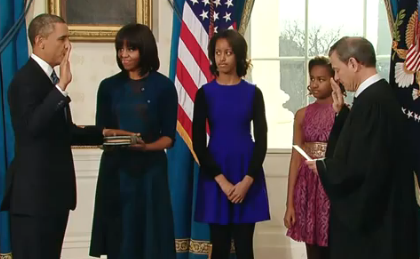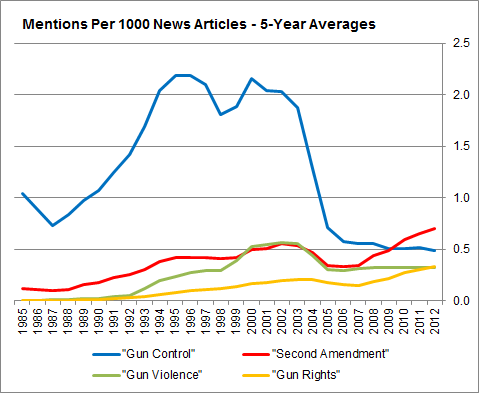Obama speaks Chinese
"Hacked" (editorial cartoon by Scott Stantis, Chicago Tribune, Feb. 21, 2013):
Read the rest of this entry »
"Hacked" (editorial cartoon by Scott Stantis, Chicago Tribune, Feb. 21, 2013):
Read the rest of this entry »
The following feature from the Nandu website includes many strange and droll language games:
Read the rest of this entry »
The form and content of Barack Obama's Second Inaugural have stimulated even more than the usual amount of commentary, including some analyses of linguistic interest. For today, I'll limit myself to noting that one aspect of the president's performance gave Bryan Garner a case of the vapors:
Listening to the Inaugural Address now. Oh dear. President Obama said "tenants of our faith" this morning instead of "tenets."
— Bryan A. Garner (@BryanAGarner) January 21, 2013
Read the rest of this entry »
Having learned his lesson in 2009, today Chief Justice Roberts apparently had the oath of office written out on a sheet of paper in his hand, and thereby avoided any uncertainties about adverb placement:
Audio clip: Adobe Flash Player (version 9 or above) is required to play this audio clip. Download the latest version here. You also need to have JavaScript enabled in your browser.

Read the rest of this entry »
Raymond Li has an article in the South China Morning Post (Friday, 21 December, 2012) in which he announces the results of a poll by the Education Ministry that has selected mèng 梦 ("dream") as the character of the year, ostensibly because it represents the hopes and achievements of the nation. But mèng 梦 ("dream") is definitely a double-edged sword, and critics of the government put a totally different spin on the word.
Read the rest of this entry »
 In response to yesterday's tragedy, Nate Silver takes an interesting look at changes over recent years in the frequency of certain gun-related phrases in the news ("In Public ‘Conversation’ on Guns, a Rhetorical Shift", NYT 12/14/2012):
In response to yesterday's tragedy, Nate Silver takes an interesting look at changes over recent years in the frequency of certain gun-related phrases in the news ("In Public ‘Conversation’ on Guns, a Rhetorical Shift", NYT 12/14/2012):
Friday’s mass shooting at an elementary school in Newtown, Conn., has already touched off a heated political debate. Opponents of stricter regulation on gun ownership have accused their adversaries of politicizing a tragedy. Advocates of more sweeping gun control measures have argued that the Connecticut shootings are a demonstration that laxer gun laws can have dire consequences. Let me sidestep the debate to pose a different question: How often are Americans talking about public policy toward guns? And what language are they using to frame their arguments?
Read the rest of this entry »
Teenie Matlock, "Framing Political Messages with Grammar and Metaphor", American Scientist Nov.-Dec. 2012:
Millions of dollars are spent on campaign ads and other political messages in an election year, but surprisingly little is known about how language affects voter attitude and influences election outcomes. This article discusses two seemingly subtle but powerful ways that language influences how people think about political candidates and elections. One is grammar. The other is metaphor. […]
Read the rest of this entry »
Recently, the Economist referred to the president of Taiwan as a "bumbler": “Ma the bumbler: A former heart-throb loses his shine" The Taiwanese media translated "bumbler" as 笨蛋 ("stupid egg / oaf"), which caused Ma's supporters to have conniptions: "'Ma the bumbler' Economist report causes storm in Taiwan".
To call someone a bèndàn 笨蛋 ("stupid egg / oaf") or even a dà bèndàn 大笨蛋 ("big stupid egg / oaf") is not really that bad. Presidents in Western nations are called by terms of opprobrium that are much worse than that every day. Indeed, my wife used to call me bèndàn 笨蛋 ("stupid egg / oaf") or dà bèndàn 大笨蛋 ("big stupid egg / oaf") in an affectionate manner. So it's hard to fathom why calling Ma Ying-jeou a "bumbler" — translated into Mandarin as bèndàn 笨蛋 ("stupid egg / oaf") or dà bèndàn 大笨蛋 ("big stupid egg / oaf") — would occasion such an uproar.
Read the rest of this entry »
Chris Moody, "New Mexico Gov. Susana Martinez: Comments like Romney’s set ‘us back as a party’", Yahoo News 11/15/2012:
Martinez criticized Romney's comments when they were reported in September, and on Wednesday reiterated that she found them "ridiculous."
"It's a ridiculous statement to make. You want to earn the vote of every single person you can earn, whether they be someone who relies on," she said. "Why would you ever write off 47 percent?"
Read the rest of this entry »
Writing recently for the online Ideas section of Time, Jeffrey Kluger took on the "We are all X (now)" trope, or as it's called in these parts, a snowclone. "This increasingly common trope has an easy, fill-in-the-blank quality to it that allows us to affect a bit of purloined heroism, put it on the credit card of someone else, and feel pretty darned good about ourselves in the bargain," he writes. Kluger quotes me on the history of the snowclone (which I looked into for a 2006 LL post), and its ready adaptability to various expressions of empathy and solidarity. Now, in a thinkpiece about Obama's re-election, David Simon (creator of the HBO shows "The Wire" and "Treme") takes the snowclone to its logical conclusion: "We are all the other now."
Read the rest of this entry »
For the linguistically sensitive, one of the burning questions stemming from last night's election-night coverage was, "When did vote become a mass noun?" Several observers picked up on the usage: Monica Macaulay on the Mr. Verb blog, Nancy Friedman on the Fritinancy blog, and Josef Fruehwald, Jonah Ostroff, Dane Pritchard, Kate Stafford, and Elizabeth Preston on Twitter. If you missed the mass-nounification of vote, you can hear several examples in this clip documenting the remarkable moment on Fox News when Megyn Kelly confronts her number-crunching Decision Desk colleagues after Karl Rove questioned their call of Ohio for Obama:
Read the rest of this entry »
Ben Yagoda spotted a nice case of overnegation on NPR's "Morning Edition" earlier today, when Renee Montagne interviewed political science professor Michael McDonald about early voting. After explaining that Obama was leading in early voting in Nevada, McDonald said, "I don't want to discourage people from not voting today."
Read the rest of this entry »